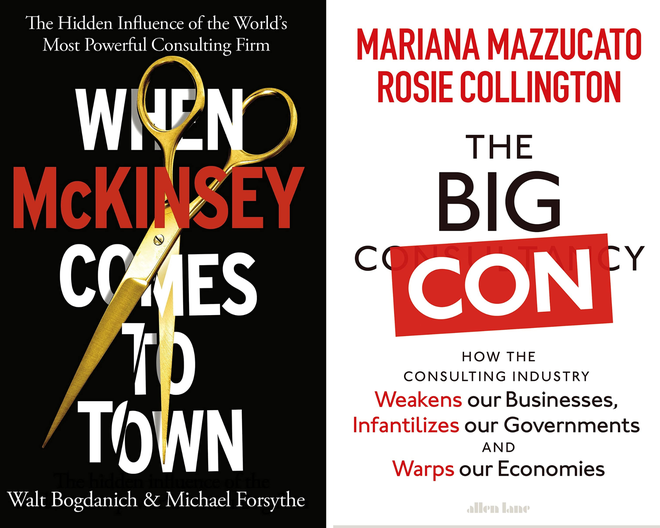Ever since Christoph Waltz played the charming, ruthless Nazi officer Hans Landa in Quentin Tarantino’s Inglourious Basterds, he has been Hollywood’s go-to man to portray villains designed to creep the hell out of you. The fact that Waltz is also frequently funny is just an added bonus. His latest star turn sees him as Regis Patoff, the titular role in the Amazon Prime Video horror-comedy series The Consultant (based on American novelist Bentley Little’s book of the same name).
Patoff is the smarmier-than-thou consultant who takes over a mobile gaming company called CompWare in the wake of its CEO’s grisly death-via-gunshot. Soon, Patoff — who may or may not be a literal demon from hell — insinuates himself into the personal lives of his new employees, manipulating them expertly. He also displays a vicious, bullying streak.
“To the wonderful faces I see below,” Patoff says during his initial interaction with CompWare employees, “Thank you for being an important part in CompWare’s success. I’m looking forward to getting to know you all personally. You are valued. And for those who work remotely, you have exactly one hour to get here in person or your contracts of employment will be terminated.”Shift in public opinion
Shift in public opinion
Patoff’s satirical characterisation (consultants are hell-spawn!) is significant, for it is in line with the consultancy industry’s diminishing powers and failing public image in recent years. Since February, The Big Four — Deloitte, KPMG, Ernst & Young, and PwC (PricewaterhouseCoopers) — have all announced massive lay-offs, Deloitte being the latest. Cumulatively, over 10,000 people in the industry have recently been fired. For politicians in the U.S. and the U.K., especially, association with big consultancy firms is now seen as more of a liability than an asset. The incumbent American Transport Secretary Pete Buttigieg faced a persistent line of attack from opponents during his 2020 presidential run, regarding his stint with McKinsey in 2008. The charge was that Buttigieg helped McKinsey fix bread prices for the Canadian chain Loblaws.

This is a significant shift in public opinion, and at a fairly rapid pace, too. As recently as the late 2000s, consultancies were at their peak, wielding power and influence via both corporate and governmental clients. At some of the world’s most prestigious colleges, a consultancy job at one of the Big Four was highly sought-after, to say the least. And while perceived value does not vanish overnight, the last few years have eroded a lot of the goodwill and cultural cachet.
Recently, there have been two major non-fiction books that have laid down compelling cases for the widespread corruption and incompetence displayed by large consultancy firms. The New York Times reporters Walt Bogdanich and Michael Forsythe’s When McKinsey Came to Town: The Hidden Influence of the World’s Most Powerful Consulting Firm paints a troubling picture. Through first-hand accounts and deep reporting via both public domain and privately sourced texts, the authors detail how McKinsey recommended deep cuts into Disney’s workforce. They allegedly ignored the effects on safety and maintenance, leading to accidents on rides, not to mention the suicides of laid-off workers. McKinsey also recommended “turbo-charging” the sales of OxyContin, one of the drugs at the heart of America’s crushing opioid crisis.

Sheen of professionalism
And this is just the corporate side of things: the havoc wreaked via governmental clients is described adroitly by Mariana Mazzucato and Rosie Collington’s The Big Con: How the Consulting Industry Weakens our Businesses, Infantilizes our Governments and Warps our Economies. The authors compare the functioning style of consultancy firms today to “the confidence tricks — or ‘cons’ — of late 19th century America’s Gilded Age”, arguing that large-scale consultancy contracts in countries around the world (but especially the U.K., the book’s focus) have led to a weakening of labour protections, union-busting, price-fixing and other shady business practices. As the authors explain in the opening chapter, “The consulting industry today is not just a helping hand; its advices and actions are not purely technical and neutral, facilitating a more effective functioning of society and reducing the ‘transaction costs’ of clients. It enables the actualization of a particular view of the economy that has created dysfunctions in government and business around the world.”
The book also details how consultancies use buzzwords liberally in order to give the sheen of professionalism to their half-baked or poorly-thought-out ideas. Puerto Rico is handed a “schema” to revive its economy and the million-dollar idea turns out to be dropping any pretence of labour protection whatsoever and privatising key public institutions, essentially leaving the most vulnerable sections of society on their own.

When we see Regis Patoff in The Consultant, dressed impeccably in a suit and tie, we see an utter lack of empathy, a certain silver-tongued menace and the impossible-to-miss air of larger, more sinister engines in play. That is the precise set of traits that journalists, writers and the public at large is associating with the consultancy industry today — and they have only themselves to blame.
The writer and journalist is working on his first book of non-fiction.







